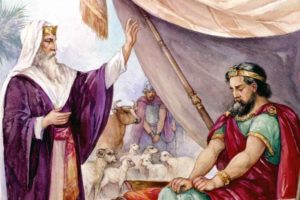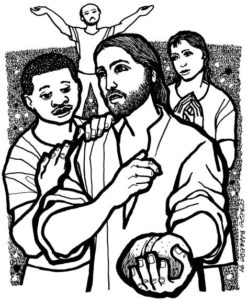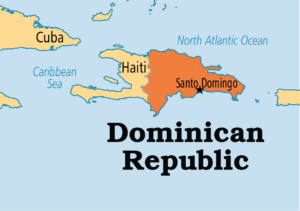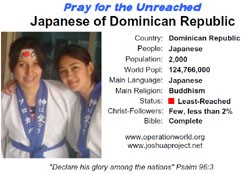Samuel’s sons were appointed as judges over Israel, but they proved themselves to be greedy for money. They accepted bribes and perverted justice.
The Israelites confronted Samuel with their disappointment in the quality of the behavior of his sons. They were concerned that they now lacked good leadership. But rather than turning to the Lord for His wisdom, they turn to the example of other nations, and desire to imitate them by establishing a king.
Israel’s turning to the nations for guidance and demanding a king was prophesied in the Book of the Law given to Moses (Deuteronomy 17:14).
Deuteronomy 17:14-15 14 “When you enter the land which the LORD your God gives you, and you possess it and live in it, and you say, ‘I will set a king over me like all the nations who are around me,…”
Samuel is very upset by this request and, unlike his fellow-Israelites, he goes to the Lord for guidance (1 Sam 8:6). The Lord gives Samuel a warning to pass on to the people. By leaning on their own understanding and aspiring to be like other nations, they were continuing in their pattern of rejecting their God and servicing idols instead.
He clarifies that in desiring a king like that of other nations, they were rejecting the Lord. “They don’t want me to be their king any longer” (1 Sam 8:7). Samuel was not to take the people’s rejection personally.
Samuel was to pass on the warning that their kings would bring oppression, draft their sons into their armies, take their sons and daughters into hard labor as slaves to sustain their lavish lifestyle and support the prosperity of his government officials. Their king will demand a tithe (a tenth) of their harvest and flocks.
Chapter 9 introduces “the people’s choice” for a king (Saul). In Chapter 16 we will be introduced to God’s choice, (David).
Saul was the most handsome man in Israel, standing a head taller than anyone else. He represents all that the people were looking for in a King. He was the image, the brand, voted most likely to succeed in representing Israel to the other nations. People would now look to the King of Israel rather than the God of Israel.
Our first glimpse of Saul reveals that he is nothing like the self-sacrificing shepherd we shall see in Israel’s future King David. Saul is searching for his father’s stray donkeys. It is a search he easily gives up. His care for others does not go far. Rather than personally seeking God, Saul experiments by turning to any person who claims to mediate the mind of God to man, the seers. Later in his life, we will see Saul consulting with a witch.
In this case, Saul happens to meet a true seer, Samuel. The Lord has already shown Samuel that Saul is the man that the people are asking for and that he will be instrumental in furthering the nation’s deliverance from the Philistines. Samuel tells Saul that he and his family are now the focus of all of Israel’s hopes (verse 19).
Saul attempts to skirt this responsibility by claiming that he was from the least important family in the smallest tribe Israel.
Immediately, in obedience to the Lord, Samuel shows Saul the honor of a king. On the following day he will be privately anointed as king.
READING FROM THE NEW TESTAMENT: John 6:22-42.
Rather than seeking Jesus because the ‘sign-events’ indicated that He was the Messiah, the Son of God, people sought Jesus because of the material benefits that He provided- food in their bellies, and healing to the sick. Jesus challenged them to look beyond the temporary perishable provisions of food and healing to the eternal life that He, as the Son of Man, can give (John 6:27).
“We want to perform God’s works too!” they replied. They missed the point of the miracles.
John 6:29 (NASB) 29 Jesus answered and said to them, “This is the work of God, that you believe in Him whom He has sent.”
They also misunderstood the events of the Old Testament- as if Moses did the miracles. Jesus explained that it was His father who did the miracles then and it was the Father who was doing the miracles now through the Son.
Secondly, they kept looking for something to be the satisfier of their hunger other than Jesus Himself. The claim is outlandish but true— If we believe on Christ, come to Him for salvation, we will never again be hungry or thirsty.
Thirdly, He gives the promise that all who believe in Him will not only be satisfied in heart, mind, and soul, but will be raised up at the last day.
A further claim Jesus makes is that He came down from heaven. He claims His pre-existence with God.
John 6:38 38 “For I have come down from heaven, not to do My own will, but the will of Him who sent Me.
The people find these claims difficult to swallow and proceed to back off, murmuring in unbelief, as did their ancestors in the wilderness.
John 6:42 (NASB) 42 They were saying, “Is not this Jesus, the son of Joseph, whose father and mother we know? How does He now say, ‘I have come down out of heaven’?”
READING FROM THE PSALMS – Psalm 106:32-48.
The reading from Psalms takes us right back to the Israelites murmuring due to the lack of water in the wilderness. They angered the Lord and caused Moses much trouble, causing him to speak foolishly and strike the rock.
The sins of unbelief are listed in verses 34-39. The consequence was God’s chastisement in which He handed Israel over to the domination of pagan nations. Yet even in the chastisement, God’s mercy shines through.
Verse 47 is the cry for deliverance! Save us, O Lord our God!
Psalm 106:47 (NASB)
47 Save us, O LORD our God, and gather us from among the nations, to give thanks to Your holy name and glory in Your praise.
The Psalm concludes with an exultant call to worship. Let the people say “Amen!” “Praise the Lord!”
TODAY’S PROVERB- Proverbs 14:34-35
Proverbs 14:34-35 (NASB) 
34 Righteousness exalts a nation, but sin is a disgrace to any people. 35 The king’s favor is toward a servant who acts wisely, but his anger is toward him who acts shamefully.
We see this proverb exemplified in the history of Israel, and the nations of the world and all its leaders.
PRAY FOR THE NATIONS
Dominican Republic
Republica Dominican
Caribbean
Geography
Area: 48,443 sq. km
The eastern two-thirds of the island of Hispaniola, shared with Haiti.
Population: 10,225,482 Annual Growth: 1.41%
Capital: Santo Domingo
Urbanites: 70.5%
HDI Rank: 90 of 182 (UN Human Development Reports 2009)
Peoples
Peoples: 18 (11% unreached) All peoples
Unreached Peoples Prayer Card
Official language: Spanish Languages: 8 All languages
Religion
Largest Religion: Christian
| Religion | Pop % | Ann Gr | |
| Christians | 9,647,742 | 94.35 | 1.3 |
|
931,234 |
9.1 |
2.8 |
Challenges for Prayer
Evangelical growth continues – with numbers more than doubling from 1990 to 2010. The Pentecostal/charismatic churches claim large increases in numbers; the ministries of Brethren, Baptists and many others are effective in their holistic and empowering approach. Pray that the dynamism and ambition of the former groups might be wedded to the hands-on transforming ministry of the latter, so that growth might be in number and in quality. Many are open to the gospel when presented simply and in love.
PRAYER: Father, we thank You for calling us into the fellowship of Your Son and for the access He has given into Your presence. He has solved the leadership crisis in our souls. We need the rule of our Shepherd-King, lest we lean on our own understanding and turn towards the idolatrous leanings of our own nature. Thank You for the Holy Spirit who enthrones His rule of righteousness, peace, and joy in our hearts. Be exalted, O God, in every area of our lives, in our nation, and in this world through the transforming power of Your gospel. In Jesus’ Name. Amen.
- Pastor David
